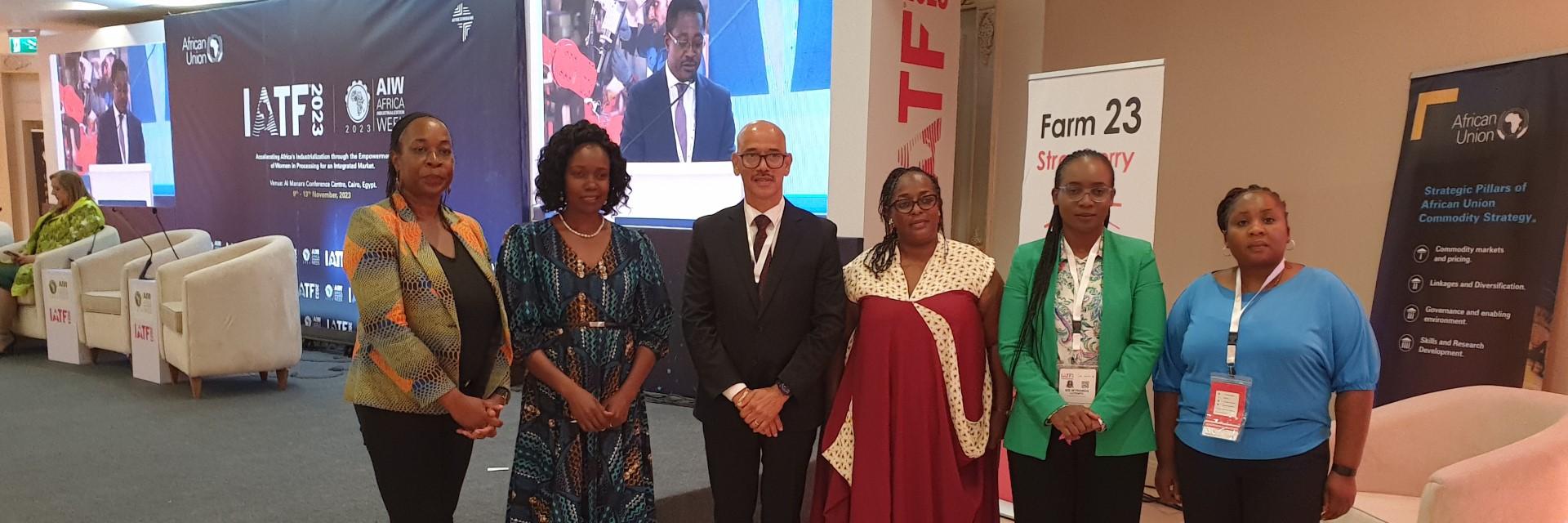Cairo, Egypt, 11 November 2023 - “The establishment of digital traceability systems in the horticulture supply chain in our countries reduces compliance costs for exporters”, said Ms. Olayinka Bandele at the side event organized by the Economic Commission for Africa, Sub-Region Office for Southern Africa (ECA SRO-SA) in collaboration with the African Union Regional Office for Southern Africa (AU-SARO), during the Africa Industrialization Week (AIW), 11-13 November 2023 in Cairo, Egypt to support women exporters.
The Chief, Inclusive Industrialization Section, SRO-SA was moderating a high-level panel discussion whose major objectives were to: Interrogate the major market access impediments faced by women-owned export companies in the horticulture value chain; assess the role of digital technologies in driving competitiveness through effective Sanitary and Phyto Sanitary (SPS) management systems, traceability applications and enhanced cultivation methods; and proffer recommendations to address the challenges faced by women.
The panel included two women exporters. Ms. Bupe Chipili Mulapesi founder of “Farm23 Strawberry Zambia”, a specialized entity into organic strawberry farming in Zambia, since 2009 and recipient of several agriculture awards in promoting sustainable agriculture farming practices including; the 2020 Anakazi Banking Zambian Women of the Year Agriculture Award and the 2019 Zambia Female Agri-Business Entrepreneur Award. The second panellist was Ms. Ngabaghila Chatata, CEO of Thanthwe Farms in Lilongwe, Malawi. She is a leading Malawian horticulturist and Agricultural entrepreneur, whose farm also offers specialised expertise in business incubation, agro– processing, greenhouse manufacturing and capacity building in climate smart technologies.
Both exporters outlined the major impediments faced by women in horticulture business. Ms. Mulapesi emphasized the importance of African women producers, she indicated that most women were good producers and had great potential to feed the continent. She called on African leaders and international organisations to use the platforms such as Intra- African Trade Fair (IATF) and Africa Industrialisation Week (AIW) to support women’s access to external markets such as the European Union. She noted that, “Standards, especially private standards and licensing increases the costs of certification, making it difficult for women to export to lucrative markets”.
Reflecting further, Ms. Chatata spoke about the non-availability of expertise in the export field, especially in Southern Africa. She highlighted on challenges faced to obtain certain certification requirements where-by there is limited expertise at country level to support such processes and that sourcing experts elsewhere adds to the certification costs. She pointed out that considering many incubators that were coming up to support women with many investments done by development partners and governments, there was a lot of focus on entrepreneurial skills. For example, in the certification of Hazard Analysis Critical Control Point (HACCP) of , which is a market access requirement for high end markets such as the European Union (EU), the CEO has had difficulties finding the expertise in the country to provide on-site services at her farm and had to arrange with a South African company. This is a further expanse to the business in addition to meeting other standard requirements for both regional and international markets.
Two experts were then asked to tackle the side event theme on, “Leveraging Digital Technologies to Enhance Market Access for Women-owned Export Companies in the horticulture Value Chain”. Ms. Laura Naliaka, trade policy expert at the Africa Trade Policy Centre at United Nations Economic Commission for Africa (ECA), where she leads the work streams on informal cross-border trade and standardisation, among others and Mr. Chikakula Miti, Acting CEO- COMESA Federation of Women in Business (COMFWIB). COMFWIB has a mandate to promote the participation of women entrepreneurs in the COMESA Regional Integration Agenda.
Ms. Naliaka spoke to the panel about how digital technologies considering the era of the fourth industrial revolutions are instrumental in addressing the challenges that are faced in accessing new markets. She said some of these technologies could be deployed from the commencement of the production process to when the products reach the end users. Firstly, she advised the farmers to use new technologies to boost productivity by optimizing the inputs available. This is important for expanding access to European and international markets. Secondly, she alluded to the importance of collecting data to ensure traceability of products. The data collected, can also be handy to institutions who oversee harmonizing and developing the relevant standards.
Mr. Miti speaking from the perspective of his work with the Federation of Women in Business, highlighted support needed for women exporters which include the need to build capacity especially on SPS measures for women entrepreneurs to be export ready and reconnect them to export markets. Mr. Miti also highlighted on challenges that women exporters face in terms of the cold supply chain for horticulture products which are essential to reduce post-harvest loses, horticulture products being highly perishable. He noted that provision of such infrastructure will facilitate expansion of market opportunities to both regional and international markets. He indicated that, “data from COMESA shows that the horticultural industry is growing at a strong pace of 3% per annum. This industry will continue growing and we need to look at how to harness the regional markets under the African Continental Free Trade Area Agreement (AfCFTA), which are more friendly than the EU market”.
The side event session was closed by Mr. David Claude Pierre, African Union Permanent Ambassador for Southern Africa. He alluded to the discussion surrounding challenges that women businesses were facing in Africa, some of which include training, capacity building and business standards. He indicated that women are more than 50% of the African population and recognising that they can play a pivotal role in industrialising Africa and transforming its socioeconomic development into one that is competitive globally is crucial. He reiterated that the side event was within the context of agenda 2063, pushing to transform Africa into a future global powerhouse. He ended that, “Africa needs to take advantage of the AfCFTA, which addresses some of the impediments that prevent Women-owned Export Companies in the horticulture Value chain accessing external Markets”.

